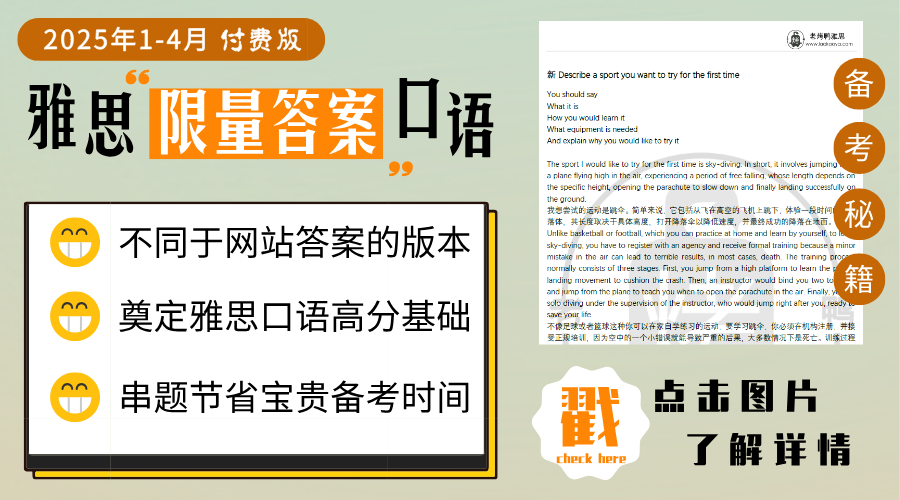People have a variety of food transported from all over the world 雅思写作食物类7分范文
这道题目首次出现在2017年5月13日的雅思考试中,要求大家探讨跨国运输而来的食物的好坏。其好处自然是扩大了当地民众的选择范围,提升了他们的生活水平。而坏处则有运输过程中产生的污染,对本地菜农的威胁,以及促进奢华的生活方式等。
雅思写作大作文题目
In some countries, it is possible for people to have a variety of food that has been transported from all over the world. To what extent do you think its benefits outweigh the drawbacks?
在一些国家,人们可以吃到来自世界各地的多种食物。你在多大程度上觉得其好处大于坏处?
雅思写作食物类7分范文
开头段
In an increasingly globalized world, the availability of a wide variety of foods from different corners of the globe has become a common feature in many countries. While this phenomenon offers undeniable advantages, it also raises concerns.
在一个日益全球化的世界中,许多国家能够享用来自世界各地的各种各样的食物。虽然这种现象无疑带来了好处,但也引发了一些担忧。
多样食物对个人的好处
To begin with, the advantages of having access to a global food supply are manifold. Firstly, it contributes to culinary diversity, allowing people to savor the tastes of different cultures without leaving their own countries. This can promote cultural exchange and understanding. Moreover, it ensures a year-round supply of fresh produce, regardless of local climate conditions. This is particularly important in areas with harsh winters or arid climates, as it helps combat food scarcity.
首先,拥有全球食物供应的优点不计其数。第一,它有助于丰富饮食多样性,使人们无需离开自己的国家就能够品尝不同文化的菜肴。这可以促进文化交流和理解。此外,它确保全年都能接触新鲜食材,不受当地气候条件的限制。这对于冬季寒冷或气候干旱的地区尤为重要,因为它有助于应对食品短缺问题。
多样食物对国家的好处
Additionally, global food transport has created economic opportunities for developing nations by stimulating agriculture and exports. It also supports global trade, which in turn fosters international cooperation and peace. Furthermore, it enhances food security by reducing reliance on a single source of supply, thus mitigating the impact of natural disasters or geopolitical crises on food availability.
此外,通过刺激农业和出口,全球食品运输也为发展中国家创造经济发展的机会。它还推动全球贸易,从而促进国际合作和和平。最后,它减少对单一供应源的依赖,从而减轻自然灾害或地缘政治危机对食品供应的影响,提高了食品安全性。
多样食物的坏处
Nevertheless, there are drawbacks associated with the global food supply. The carbon footprint of transporting food over long distances is a major concern, contributing to greenhouse gas emissions and climate change. Furthermore, the dependence on international trade can make countries vulnerable to price fluctuations, making food less affordable for the most vulnerable populations. Additionally, the loss of regional food traditions and the standardization of tastes can be seen as cultural drawbacks.
然而,全球食品供应也带来一些坏处。一个主要问题是将食品从遥远的地方运输到本地的碳排放量,加剧温室气体排放和气候变化。此外,依赖国际贸易可能使国家容易受到价格波动的影响,使最弱势的人口更难承受食品成本。最后,失去地区食品传统和口味的单一化也被视为文化上的缺点。
结论
In conclusion, the benefits of having a diverse food supply from around the world clearly outweigh the drawbacks. It enhances culinary diversity, supports global trade, and ensures food security. However, it is essential to address the environmental and cultural concerns by promoting sustainable practices and preserving local food traditions. Balancing the advantages with the drawbacks is necessary to fully enjoy the benefits of a global food supply.
总之,来自世界各地的多样化的食品供应的好处明显大于缺点。它丰富了饮食多样性,支持全球贸易,并确保食品安全。然而,有必要采取可持续措施,保护当地食品传统以解决环境和文化方面的问题。平衡好处与缺点对于充分享受全球食品供应的好处是必要的。
点击查看其他雅思写作历年真题范文


